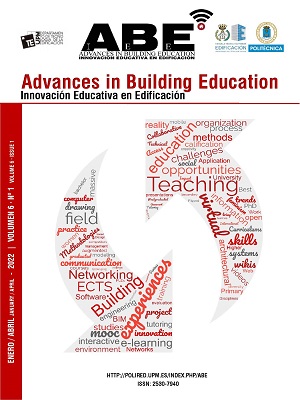Analysis of the spatial skills of the degree student in engineering: A gender approach
DOI:
https://doi.org/10.20868/abe.2022.1.4810Palabras clave:
Spatial Skills, Gender, University Students, EngineeringResumen
The objective of this work is to carry out an approach to the study of spatial skills by gender in engineering students. For this, the analysis of a test consisting of 12 questions was carried out on a sample of 220 students from the Universidad Politécnica de Madrid, of which 134 were male and 81 were female. The study evaluated three different types of spatial skills such as relation, rotation, and visualization. From the analysis of the results obtained in the sample, it appears that in engineering degree courses the difference between men and women in terms of spatial ability is not significant, with other variables such as the university degree carried out by the sample showing a greater statistical association.Descargas
Referencias
Ogunkola, B. y Knight, C. "Does technical drawing increase students' mental rotation ability?", Cogent Education, 5, 2018. https://doi.org/10.1080/2331186X.2018.1489209
Spence, I. y Feng, J., "Video Games and Spatial Cognition". Review of General Psychology, 14 (2): 92-104, 2010 https://doi.org/10.1037/a0019491
Nagy-Kondor, R., "Gender differences in spatial visualization skills of engineering students". Annales Mathematicae et Informaticae, 46: 265-276, 2016.
Lohamn, D., "Spatial Ability: a review and reanalysis of the correlational literature". Aptitude research project, School of Education, Stanford University, 1979.
Linn, M. C. y Petersen, A. C., "Emergence and characterization of sex differences in spatial ability: a meta-analysis". Child Development, 56 (6): 1479-1498, 1985. https://doi.org/10.2307/1130467
Ecuyer-Dab, I. y Robert, M., "Have sex differences in spatial ability evolved from male competition for mating and female concern for survival?". Cognition, 91: 221-257, 2004. https://doi.org/10.1016/j.cognition.2003.09.007
Arrieta, I. y Medrano, M. C., "Un análisis de la capacidad espacial en estudios de ingeniería técnica". PNA, 9 (2): 85-106, 2015. https://doi.org/10.30827/pna.v9i2.6104
Villa Sicilia, A., Desarrollo y evaluación de las habilidades espaciales de los estudiantes de ingeniería. Actividades y estrategias de resolución de tareas espaciales. Tesis doctoral. Universitat Politècnica de Catalunya, Departament D'Expressió Gràfica a l'Enginyeria, 2016.
Sorby, S. A., "Educational research in developing 3-D Spatial Skills for Engineering Students". International Journal of Science Education, 31 (3): 459-480, 2009. https://doi.org/10.1080/09500690802595839
Maeda, Y. y Yoon, S. Y., "A meta-analysis on Gender Differences in Mental Rotation Ability Measured by the Purdue Spatial Visualization Tests: Visualization of Rotations (PSVT:R)". Educational Psychology Review, 25: 69-94, 2013. https://doi.org/10.1007/s10648-012-9215-x
Subirats, M. y Tomé, A. Balones fuera. Reconstruir los espacios desde la coeducación. Ediciones Octaedro, Barcelona, 2007
Varela, N., Feminismo para principiantes. Ediciones B, Barcelona (2013)
Stumpf, H. y Eliot, J., "Gender-related differences in spatial ability and the k factor of general spatial ability in a population of academically talented students". Personality and Individual Differences, 19 (1): 33-45, 1995. https://doi.org/10.1016/0191-8869(95)00029-6
Shepard, R. N. y Metzler, J., "Mental rotation of three-dimensional objects". Science, 171 (3972): 701-703, (1971) https://doi.org/10.1126/science.171.3972.701
Sánchez García, V., "Diferencias de sexo y el aprendizaje de las matemáticas". SUMA, 14/15: 18-24, 1994
Burin, D., Delgado, A. y Prieto, G., "Solution strategies and gender differences in spatial visualization tasks". Psicológica, 21: 275-286, 2000.
Barry, S., "Sex differences in mental rotation and spatial visualization ability: Can they be accounted for by differences in working memory capacity?". Intelligence, 35, 211-223. DOI: 10.1016/j.intell.2006.07.009., 2007. https://doi.org/10.1016/j.intell.2006.07.009
Fontaine, M., De Rosa, A. J. y Metz, S. S, "A first-year engineering spatial skills workshop: implementation, effectiveness and gender differences". American Society for Engineering Education (ASEE), 2019.
Descargas
Publicado
Número
Sección
Licencia
ABE (Advances in Building Education / Innovación Educativa en la Edificación) no aplica cargo alguno a los autores por procesar o publicar un artículo y provee acceso abierto (Open Access) inmediato a su contenido. Todo el contenido está disponible gratuitamente sin cargo para el usuario o su institución. Se permite a los usuarios leer, descargar, copiar, distribuir, imprimir, buscar o vincular a los textos completos de los artículos, o utilizarlos para cualquier otro propósito lícito, sin pedir permiso previo del editor o el autor. Esto está de acuerdo con la definición de acceso abierto de la BOAI.
1. Los autores conservan los derechos de autor y garantizan a la revista el derecho de una Licencia Creative Commons Atribución / No Comercial / No Derivadas 4.0 Internacional (CC BY NC ND) que permite a otros compartir el trabajo con un reconocimiento de la autoría y uso no comercial.
2. Los autores pueden establecer por separado acuerdos adicionales para la distribución no exclusiva de la versión de la obra publicada en la revista (por ejemplo, situarlo en un repositorio institucional o publicarlo en un libro).
Salvo indicación contraria, todos los contenidos de la edición electrónica se distribuyen bajo una licencia de uso y distribución “Creative Commons".














